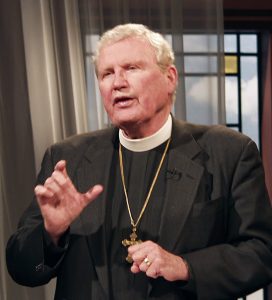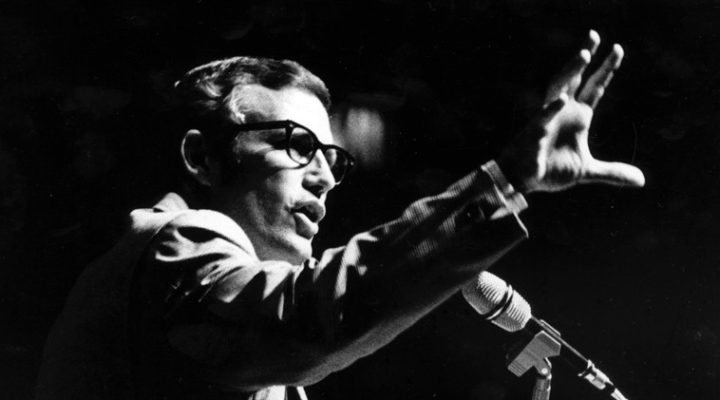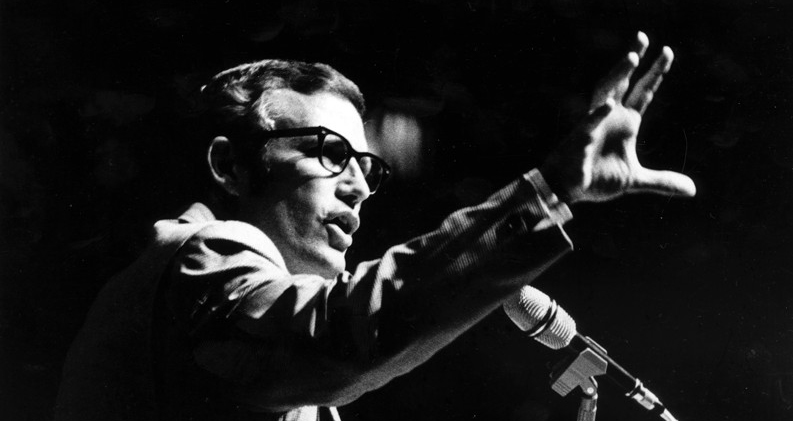If you’ve ever heard a sermon preached by a moderate Baptist pastor, you’ve likely heard the influence of John Claypool, whether you knew it or not.
Claypool served four well-known Baptist churches as pastor in the second half of the 20th century before becoming an Episcopal priest. He was best-known for a “confessional” style of preaching that continues to be emulated by many moderate and progressive preachers.
“I know of few if any pastors or preachers who have had such a great impact on our generation of ministers as Claypool,” said Stephen Shoemaker, who followed the legendary pastor at two churches, Broadway Baptist in Fort Worth, Texas, and Crescent Hill Baptist in Louisville, Ky.
“I know of few if any pastors or preachers who have had such a great impact on our generation of ministers as Claypool.”
Shoemaker will be among the 16 presenters at a Sept. 16-18 symposium celebrating Claypool’s life and legacy. The event will be held at Crescent Hill Baptist Church as this year’s William M. Johnson Lecture Series. Registration information is online at https://gladreunion2022.eventbrite.com.
As a preacher and the author of 11 books, Claypool gained national notoriety — especially among a generation of Southern Baptist pastors coming of age as the Southern Baptist Convention splintered between “moderates” and “conservatives,” labels that influenced not only theology but also preaching styles.
Claypool’s narrative-driven preaching differed significantly from the “three points and a poem” style often associated with Southern Baptist sermons of the era. It also differed from the strictly exegetical style favored by conservative and fundamentalist preachers. Younger pastors sought to emulate his style.

John Claypool
“His innovative and deeply authentic style of proclamation developed from personal tragedy called ‘confessional preaching’ provided powerful pastoral care from the pulpit and reminded generations of Baptists and Episcopalians alike that ‘life is a gift,’” said Aaron Weaver, communications director for the Cooperative Baptist Fellowship and co-editor of a new book on Claypool that will debut at the symposium. “As a Baptist historian, I’m excited to share more about Claypool’s story and his continued influence on present-day Baptist pastors.”
Claypool’s preaching was significantly influenced by the death of his 9-year-old daughter, Laura Lue, from leukemia in 1970. His first book was on the spirituality of grief, Tracks of a Fellow Struggler. He also was shaped by and supportive of the Civil Rights movement at a time when most Southern Baptists were not.
“Over the course of his ministry, John Claypool made significant contributions to the Christian faith and the progressive Baptist tradition through his affirmation of the full dignity of Black women and men as well as his role as an ally and advocate in the civil rights struggle of the 1960s,” Aaron Weaver explained.
Claypool earned an undergraduate degree at Baylor University in Texas and then a doctorate from Southern Baptist Theological Seminary in Kentucky. Those two states would become important locales in his pastoral career. He served as senior pastor at Crescent Hill Baptist in Louisville from 1960 to 1971 and then at Broadway Baptist Church in Fort Worth from 1971 to 1976. Both congregations included large contingencies of faculty members from SBC seminaries located nearby. Thus Claypool shaped not only his congregations but also those who were teaching young pastors.
In an unusual move in 1976, Claypool left the 5,000-member Broadway Baptist Church to become pastor of a much smaller congregation of 400 members at Northminster Baptist Church in Jackson, Miss. Historically, few Baptist pastors leave larger churches to serve smaller churches. From Northminster, Claypool moved back to Texas to serve Second Baptist Church of Lubbock, but in 1985 resigned and moved toward ordination as an Episcopal priest. He served 14 years as rector of St. Luke’s Episcopal Church in Birmingham, Ala., until his retirement in 2000. He later taught preaching at McAfee School of Theology, a Baptist-affiliated seminary in Atlanta, until his death in 2005.
In 1979, Claypool became the first Southern Baptist minister to deliver the Lyman Beecher Lectures at Yale University. In the 1960s, he also appeared regularly on a weekly radio program called “The Moral Side of the News.”
Another of the young pastors deeply influenced by Claypool is Charles Johnson, who today leads the public-school advocacy group Pastors for Texas Children. Johnson was called to serve alongside Claypool as youth minister at Northminster and later followed him as pastor at Second Baptist Church in Lubbock.
Claypool played “a pivotal role” in his life and ministry, said Johnson, who is one of the organizers of the September symposium.
In addition to Shoemaker, Johnson and Aaron Weaver, other presenters at the symposium will include Kevin Cosby, president of Simmons College of Kentucky; Douglas Weaver of Baylor University; Alan Culpepper, former dean at McAfee; John W. Arnett, member of Crescent Hill Baptist Church; Glenn Jonas of Campbell University; Mark LaGory, deacon at St. Luke’s Episcopal Church in Birmingham; Henry Parsley, Episcopal bishop of Alabama; Rowan Claypool, John Claypool’s son; Loyd Allen of McAfee School of Theology; Julie Whidden Long of McAfee; Carolyn Ratliff of Birmingham; and Bill Leonard, former dean of Wake Forest University School of Divinity.


